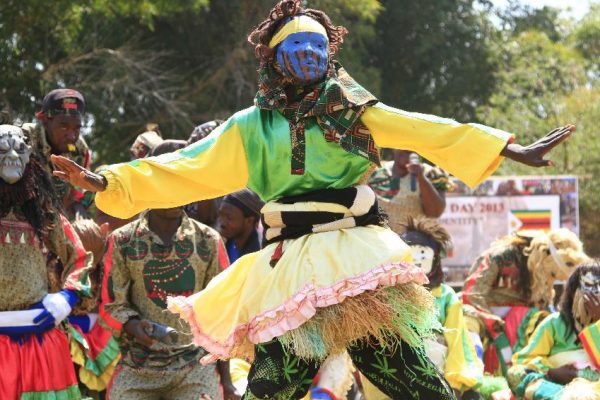
The remnants of Gule Wamkulu or nyau dancing will for decades remain etched in Mashonaland West’s farmlands, although culture’s dynamic and constantly changing nature is threatening to erode what is left of the once reverred tradition.
By Kennedy Nyavaya
Peter Chaire (17) joined the nyau ensemble at Mukonono Farm in 2015 and to date, if the moment was to be replayed, he still would join without second thoughts.
Wearing a red t-shirt, pair of shorts and a trendy green bucket hat, Chaire, who is also spotting a pink stud ring on his left ear, strikes a tangent opposite look to what a nyau dancer would have looked like a decade ago.
“Nothing changes, you remain human like others. It’s just some people’s errant conduct that makes us look bad because some stereotypes like we don’t like bathing are a lie,” he said.
Unlike other dance types, including Mbende Jerusarema and Isitshikitsha, nyau, which largely emanated from Malawi, some parts of Mozambique and Zambia, has many underlying beliefs and mysteries associated with it, which makes it unique.
According to one account, nyau is a secret society of the Chewa, an ethnic group of the Bantu people from central and southern Africa that, which with years passing, is losing its essence.
“Nowadays, it is no longer that scary because many who were part of us now go to church and even other seniors have left, so it is not as ritualistic. It is now full of young people who just get in to enjoy,” said Chaire.
- Chamisa under fire over US$120K donation
- Mavhunga puts DeMbare into Chibuku quarterfinals
- Pension funds bet on Cabora Bassa oilfields
- Councils defy govt fire tender directive
Keep Reading
“I just joined because of how they were dancing and some of their dressing, which made me love it generally.”
A United Nations Educational, Scientific and Cultural Organisation (Unesco) article says the culture was a secret cult, involving a ritual dance practised among the Chewa people and was performed by a secret society of initiated men.
Unesco also postulates that “nyau masked dancers are understood to be spirits of the dead, but increasing westernisation has led to a decrease.”
“People even tell each other [when they join] now and it is no longer as scary because back in the day, it was truly scary as you would not meet chigure on the road like nowadays,” said Chaire.
Like other cultural practices, the new millennium radical wave is proving greater such that even nyau sacred regalia no longer stays in secret enclaves in the middle of nowhere but a dancer now has the liberty to even get dressed at their houses before they leave for a performance.
What remains intact in this area, however, according to Chaire, is the initiation process largely known as chinamwari, which is a telling secret experience stretching for up to two weeks and no matter the circumstances, one should not tell non-members about the unforgettable process.
“Some leave gule when they are dead, but some go to church afterwards. However, one never forgets what they are told during chinamwari, no matter what church they go to or how old they are,” he said.
Amid all this not-so-secretive set up, older generations watch with utter disgust but are powerless to reverse the change. A former dancer known in the area as Gomo, said the modern arbitrary initiations and events where the youngsters dance, are a breach of customs he had grown to know since joining gule in 1976.
“This new kind of nyau, which is so open about their identification, is very different because ours was secretive and we would not do it randomly,” Gomo said as he recalled the days when women and children would hide in houses before a showcase.
Predictably, the nyau dance teacher is so deeply engrossed in the tradition that it is hard to squeeze information off him.
After some persistent inquisition however, the sexagenarian revealed that in his active years, they were highly sought-after and would perform at funerals, celebrations and other traditional ritual practices.
“They would know us but would not be able to identify when we were performing and that is different with nowadays where there are many young people who do not go through much of a grilling procedure,” he said.
Gomo concedes that contemporary nyau has gone off track and no longer has order but for him to change what the youngsters are doing even as a teacher “is now impossible”.
“It’s now different and we cannot undo it because these youngsters take it as a mere weekend hobby.”
Back in the day, they would play 12 drums called mbarure, which were made off python skin — a practice that has since been abolished.
Notice Mazura aka Boss Bingu, the organiser behind the three-day gule shutdown festival recently held in Mufakose, said assimilation of different cultures had diluted the occult practices.
“Mixing of cultures like embracing the Zezurus has caused the corrosion of our nyau tradition to an extent that we no longer see how good and important the actual culture was,” said Mazura.
“Procedures like chinamwari and mwambo are no longer being followed and rituals, including the sharing of chicken together during initiation, have become past practices.”
Apparently, youths are joining nyau clubs in Harare when they do not have anything to do, with some seniors not valuing the historic procedures.
“Getting back to how things were is not possible because it is now so bad that a group of people can simply decide to start their own nyau groups when they do not even understand the culture behind,” said Mazura.
National Arts Council of Zimbabwe director Elvas Mari recently told this paper that pioneers of different arts forms ought to embrace constant change.
“Along the way, we need to be able to embrace those things that are being brought up by our artistes to ensure that we make communities and the nation a better place to be,” Mari said.










